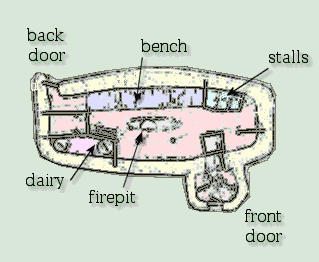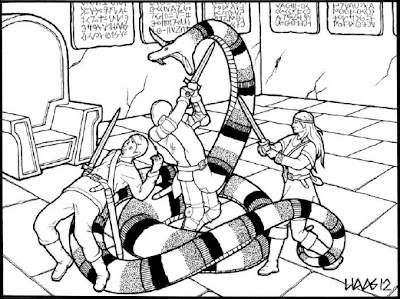One day, while arguing about different editions of D&D, somebody told me that frequent character death was antithetical to roleplaying or character development. The premise being that if characters don't have time to develop, they won't be interesting, and if characters are at constant risk of death then players won't get attached to them.
I figured this was bunk, because a) there is plenty of character development in "highly lethal" works of fiction like Game of Thrones or The Wire, and b) it's easy to roleplay and get attached to a character in, say, Fiasco, or any other one-shot for that matter, despite the fact that the character is certain to "die" (i.e. cease to be played) at the end of the session. While it's true that most old-school D&D games don't have a lot of character depth, that's more because killing monsters in a cave is a premise inherently lacking in opportunities for roleplaying*.
So I began to think about an RPG which revolves around an ensemble cast of characters with a high turnover rate - often, but not always, because of death. You could probably do this already with a collaborative story engine like Smallville or DramaSystem, but I'm aiming for something a little more traditional.
 This is a game about the Dead Company - a renowned mercenary company in the midst of a brutal war. Individuals come and go, but the company remains. I'd say that it's like the Black Company, but I haven't actually read those books yet :( Of course that's just the default, and you could run a variety of different groups: revolutionaries, pirates, dungeon delvers, colonists, Jomsvikings, etc. However, the assumption is that the company will get mixed up in ongoing plots, deal with different factions, and influence the world around them. Fifteen guys crawling through a dungeon full of hostile, mute undead is not the goal here.
This is a game about the Dead Company - a renowned mercenary company in the midst of a brutal war. Individuals come and go, but the company remains. I'd say that it's like the Black Company, but I haven't actually read those books yet :( Of course that's just the default, and you could run a variety of different groups: revolutionaries, pirates, dungeon delvers, colonists, Jomsvikings, etc. However, the assumption is that the company will get mixed up in ongoing plots, deal with different factions, and influence the world around them. Fifteen guys crawling through a dungeon full of hostile, mute undead is not the goal here.The game goes like this:
- All players generate three PCs at the start of the game. These PCs then go into the pool of playable characters. They are not 'your' PCs because you made them; anyone can play any PC and the roles can change from session to session.
- PCs don't have stats, at least not to begin with. They are primarily defined by their class and by their relationships. Each PC must have at least one relationship to another, which will be something like the relationships in Fiasco. All the PCs must be connected to each other at least indirectly. You will draw a chart of the relationships to make sure everyone is linked up to the 'web'.
- Each session consists of a mission in which one PC will be selected for each player, while the other PCs stay at home or act off-screen.
- The turnover rate is up to the group to decide, but by default you should expect 1-3 fatalities per session. There might also be rules for characters burning out and quitting the company.
 - New PCs can be brought in naturally through play, or through a mechanical device that generates them with new relationships to the existing PCs. It's possible to have relationships with deceased/retired PCs as well, e.g. a son who joins up after his father was killed.
- New PCs can be brought in naturally through play, or through a mechanical device that generates them with new relationships to the existing PCs. It's possible to have relationships with deceased/retired PCs as well, e.g. a son who joins up after his father was killed.- PCs don't advance in the sense of growing stronger, but they do grow more complex. Each time a PC survives a mission, they get an extra bit of nuance added to their character, based off something they did that session. This might be an Attribute (e.g. Strong, Weak, Clever, Stupid - equivalent of D&D stats) a Trait (personality, unusual skill, etc.) a Background (think 13th Age) a Secret (flashback to past, possible plot hook) or a Link (gained an enemy, impressed the king, downloaded the crystal memories of an alien civilisation into your brain, etc.)
- The Company as a whole advances by gaining money and renown. However, the major form of advancement in the game is simply the development of the plot towards a satisfying conclusion.
 - The core resolution system needs to be simple and easy to use. I would probably use the chassis of Basic D&D since that's something that many players are already familiar with.
- The core resolution system needs to be simple and easy to use. I would probably use the chassis of Basic D&D since that's something that many players are already familiar with.- By default, the classes would not include spellcasters, since I'm going for a more down to earth sword & sorcery tone. Also, there would be no 'fighter' class since everyone in the Dead Company is expected to be a fighter. So you might have healers, minstrels, assassins, etc. but all of that goes on top of a basic proficiency in combat.
*hurdy dur, not real roleplaying, etc., what I here mean by roleplaying is acting and thinking as your character and developing a story about the characters. Much as I love old-school D&D, it doesn't make it easy to play the role of anything but a psychopathic murderer.
More inspirational imagery:

& and meanwhile, in anime:







